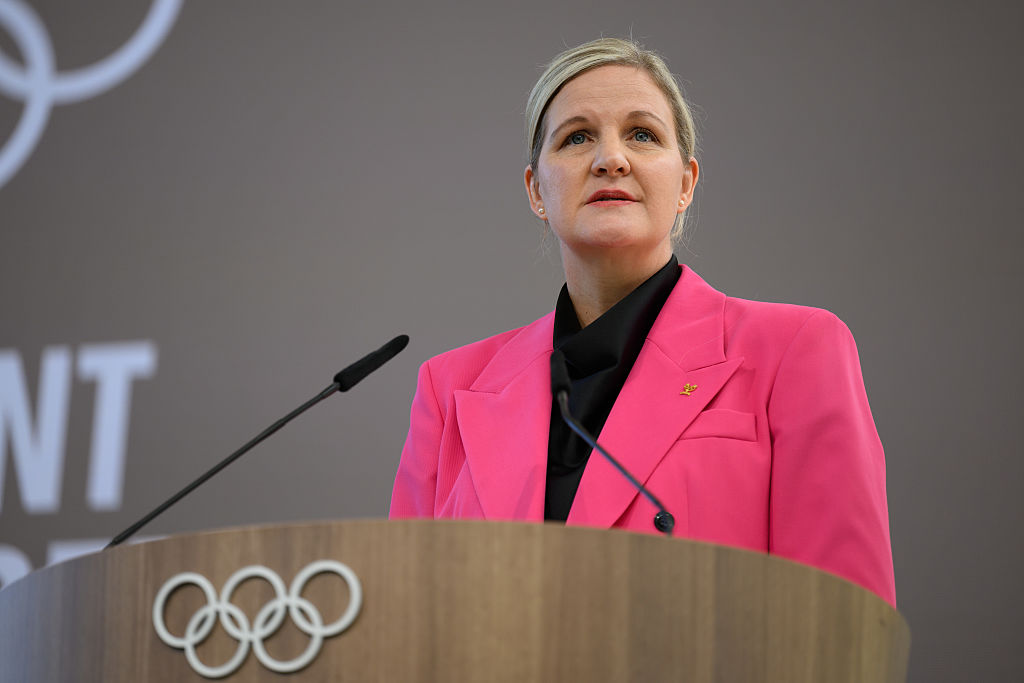
LAUSANNE, SWITZERLAND - JUNE 23: International Olympic Committee (IOC) President Kirsty Coventry speaks during the International Olympic Committee (IOC) presidential handover ceremony at Olympic House on June 23, 2025 in Lausanne, Switzerland. Kirsty Coventry will succeed the ninth IOC President, Thomas Bach, whose 12-year tenure will officially end after Monday 23 June 2025. Coventry was elected in March 2025 and is the first female President in IOC history. (Photo by Harold Cunningham/Getty Images)
LAUSANNE, Switzerland – In a decisive move, newly appointed International Olympic Committee (IOC) President Kirsty Coventry has pledged to safeguard the integrity of women’s sports categories in the upcoming 2028 Olympic Games in Los Angeles.
Immediate Impact
During her inaugural press conference on Thursday, Coventry emphasized her commitment to ensuring that biological males are excluded from women’s competitions. This stance addresses a growing concern that has significantly impacted various sports, such as Olympic boxing, where athletes like Imane Khelif and Lin Yu-Ting secured medals in the 2024 Paris Olympics.
Key Details Emerge
“We understand that there’ll be differences depending on the sport,” Coventry stated. “But it was very clear from the members that we have to protect the female category, first and foremost to ensure fairness.” She further highlighted the importance of a scientific approach and collaboration with international federations that have made strides in this area.
“It was very clear from the membership the discussion around this has to be done with medical and scientific research at the core, so we are looking at the facts and the nuances,” Coventry explained.
Industry Response
The announcement comes as a relief to many advocates for women’s sports who argue that the presence of biological males in female categories undermines competitive fairness. While some critics express skepticism, Coventry’s approach draws inspiration from World Athletics, which has already implemented measures to prohibit men from competing in women’s events.
By the Numbers
- 2024 Paris Olympics: Key events highlighted concerns over fairness.
- World Athletics: A leading example in enforcing gender-specific categories.
What Comes Next
Coventry’s leadership marks a pivotal moment for the IOC, as the organization seeks to refine its policies ahead of the 2028 Games. The timing is particularly significant because the upcoming Summer Games in Los Angeles are expected to draw global attention, and ensuring fairness in women’s sports remains a top priority.
Expert Analysis
According to sports analysts, Coventry’s stance represents a crucial step toward maintaining the integrity of women’s sports. “Her commitment to a science-based approach is commendable,” noted Dr. Jane Smith, a leading expert in sports physiology. “This ensures that decisions are grounded in evidence rather than emotion.”
Background Context
This development builds on a broader conversation within the sports community about gender and competition. The move represents a significant shift from previous IOC policies, which have been criticized for lacking clarity and consistency.
Regional Implications
Meanwhile, industry experts warn that the implications of these policies will resonate beyond the Olympic stage, potentially influencing national and regional sports organizations worldwide. The IOC’s decisions may set a precedent for how gender categories are managed in international sports.
Timeline of Events
- 2024: Paris Olympics highlight gender category concerns.
- 2028: Los Angeles Games set to implement new policies.
The move represents a significant shift from past practices, with Coventry’s leadership signaling a new era for the IOC. As preparations for the 2028 Olympics continue, the focus will remain on ensuring that women’s sports categories are protected and fair competition is upheld.






